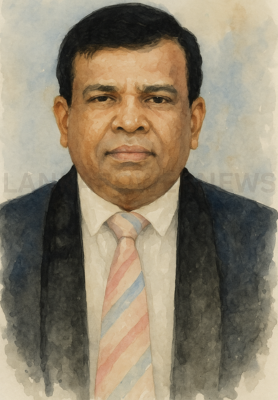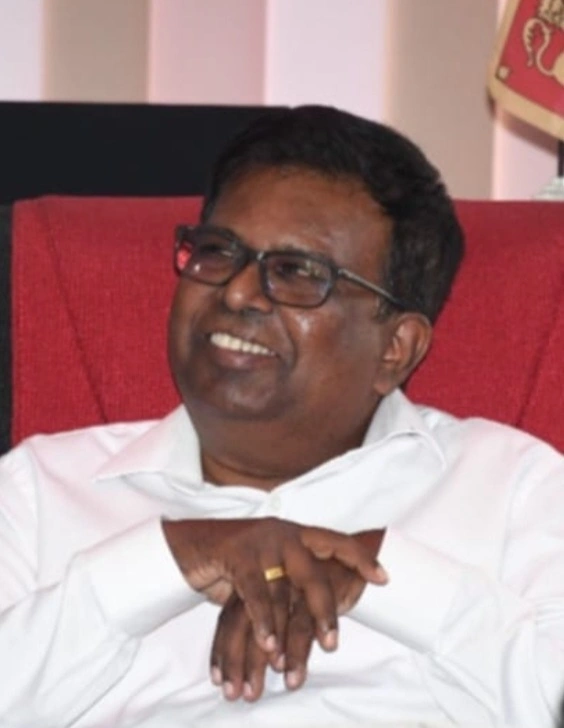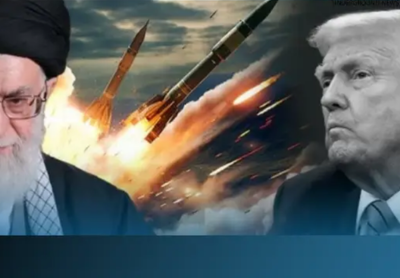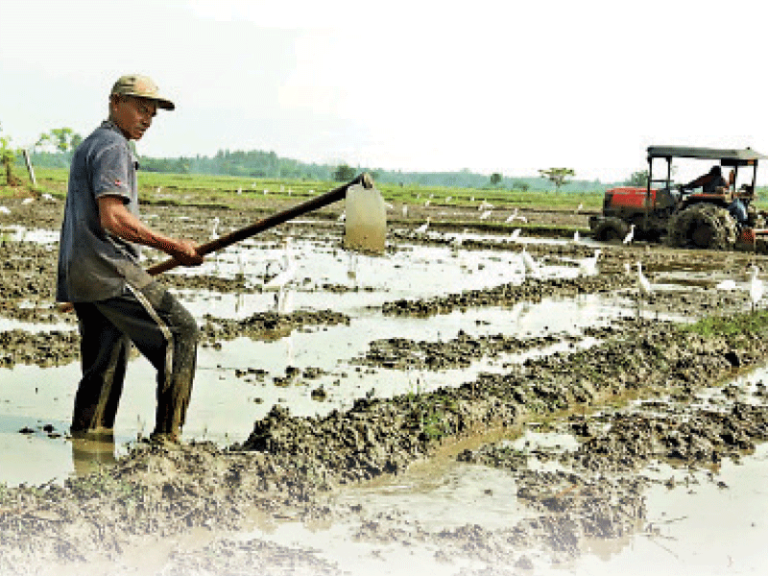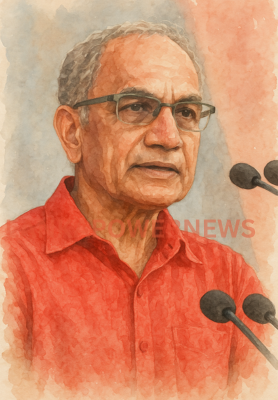Defense Agreements aren’t the problem..!
BY Gamini Jayasuriya-
What If the Real Danger Isn’t the India–Sri Lanka Defense Agreements, But Something Closer to Home? Did you know the real debate isn’t about the India–Sri Lanka defense agreements themselves, but what’s happening with our economy..?

Defense Agreements aren’t the problem..!
Did you know the real debate isn’t about the India–Sri Lanka defense agreements themselves, but what’s happening with our economy?
Right now, Sri Lanka is in a serious economic crisis. Our power company, once profitable, lost 17 billion rupees by March, only a year ago, it made 88 billion under a different government. And guess what? Salt prices have skyrocketed too, from around 150–180 rupees a kilo in the past to over 400 now. That’s wild! These struggles deserve our attention more than the defense pact.
What is this agreement really about? Well, traditionally countries traded, goods, investments, infrastructure. Take the Maldives building an 8.8 billion dollar resort by 2030, or India’s new 3.4 billion dollar Trivandrum port. These are financial moves, not invasions. The defense agreement could similarly aim to safeguard India’s investments in Sri Lanka, not to take over our land. And that makes sense: any big project needs protection.
What do you think?
Should Sri Lanka’s government be planning for these investments? Surely, they need smart diplomacy and accountability to make sure these agreements help us, not hurt us. Scholars like Dr. Dayan Jayatilaka are urging transparency, reminding us of past deals like the J.R.–Rajiv pact in 1987 that wasn’t fully explained to the public, leading to unrest. Shouldn’t we learn from that?
Here’s something to chew on: international relations aren’t what they used to be. It’s not about armies marching over plains but financial ties and trade wars. Remember how Trump framed things as “trade wars”? It’s a new world. Sri Lanka now needs to gear up for these financial battles, be informed, stay critical, and demand clarity so that any agreement supports our growth, not our decline.
Let’s walk this journey together. What role do you think we, as citizens, should play in pushing for transparency and real development?

image source-https://encrypted-tbn0.gstatic.com/images?q=tbn:ANd9GcQj7K0JK_BZr07zyNse4OrIA3PFZ3lW2W14JA&s
Did you know Sri Lanka is facing one of its worst economic downturns in recent history, yet public attention seems to be focusing more on defense agreements than daily survival? It’s true, our headlines are buzzing about a proposed defense pact with India. But while political voices argue back and forth about foreign military influence, average Sri Lankans are struggling to buy basic food, pay electricity bills, and make ends meet. So, what if the real issue isn’t a defense agreement at all, but the silent crisis happening right in our own homes?
Let’s start with what’s happening on the ground.
The Ceylon Electricity Board, which was profitable under the previous government, has now sunk into major losses, Rs. 17 billion by March 2024, to be exact. That’s not a small dip; it’s a free fall. Just one year ago, it recorded profits of Rs. 88 billion. The reasons? Increased operating costs, mismanagement, and a slow economic recovery. Now, these losses directly affect you and me, because guess who has to cover the gap? The public And it doesn’t stop there.
Something as basic as salt, once available for Rs. 150–180 per kilo, is now over Rs. 400 in many areas. Think about that for a moment. Salt! One of the oldest and most essential ingredients in our kitchen has now become a luxury for many. This isn’t just inflation, it’s a sign of a system that’s spiraling out of control.
So, while people encouraged to protest or debate the Indo–Lanka defense agreement, one has to ask: are we being distracted from more urgent economic issues?
What are the Defense Agreements, Anyway?
Let’s break it down.
The proposed defense agreements pact between India and Sri Lanka is designed, at least on paper to strengthen regional security and economic cooperation. There’s talk of safeguarding infrastructure projects, sharing maritime intelligence, and building stronger military ties to deal with regional threats. Now, is this a new idea? Not really. Countries do this all the time. India has similar agreements with other South Asian nations. Even the U.S. and Japan have longstanding military pacts with dozens of countries.
But in Sri Lanka, the fear isn’t just about military cooperation. it’s about sovereignty. Will this lead to a permanent Indian military presence? Will we lose control of our ports or land? These are real questions, and they deserve real answers.
But Here’s the Bigger Picture
Think of it this way: the global stage has changed. Wars today aren’t always fought with tanks and bombs. They’re fought with investments, ports, trade routes, and digital infrastructure. We’re in the era of financial warfare.
India, like China, is investing in strategic locations across Asia, not necessarily to conquer, but to protect its economic interests. For example, India is investing US$3.4 billion in a new port at Trivandrum. The Maldives is planning an $8.8 billion resort by 2030. These aren’t just development projects, they’re power plays.
So, when India signs a defense pact with Sri Lanka, it may not be about invading us. It could be about making sure their investments, like ports, energy grids, and shipping lanes, are safe and operational. From their perspective, it’s about securing assets. And from Sri Lanka’s perspective, we should ask: are we negotiating wisely?
What Do Experts Say?
Political analyst and diplomat Dr. Dayan Jayatilleka recently warned about the need for transparency and parliamentary debate before signing any major defense agreements. He brought up the example of the 1987 Indo–Lanka Accord, signed by President J.R. Jayewardene and Indian Prime Minister Rajiv Gandhi. they signed it in secret and without public consultation, leading to confusion, protests, and long-term consequences.

We can’t afford to repeat that mistake.
This is why any new agreement, especially one as sensitive as defense, must be debated in Parliament. The public has a right to know what’s being signed in their name. We need facts, not fear.
So, What Should We Really Be Focusing On?
While political leaders and media outlets argue over foreign relations, families in Sri Lanka are worried about school fees, cooking gas, and transport. In the North and East, many areas are still suffering from a lack of clean water and stable jobs. Fishermen are struggling to deal with foreign trawlers, and farmers can’t afford fertilizers.
The solution isn’t to ignore the defense pact, it’s to widen the conversation. Yes, let’s talk about sovereignty, but also demand action on economic planning, social equity, and sustainable growth.
What do you think would happen if our government put the same energy into rebuilding the economy as they do into these agreements? What if citizens demanded updates on food security, energy prices, or rural development with the same passion as they debate international affairs?
Final Thoughts: Let’s Not Miss the Forest for the Trees
This isn’t a call to ignore geopolitical risks or downplay international agreements. It’s a call to prioritize wisely.
Sri Lanka stands at a crossroads. We can either continue to be distracted by fear and speculation, or we can start holding our leaders accountable, both for the deals they sign and the food that’s missing from our tables.
If we’re signing a defense agreement, let it be after full public disclosure and with clearly defined national interests in mind. If we’re making economic choices, let’s focus on rebuilding trust, reducing poverty, and restoring local industry. It’s time for long-term thinking—not just reactionary politics.
So, the next time you hear someone shouting about Indian troops or foreign ports, ask them: “Sure, but have you checked the price of salt lately?”
